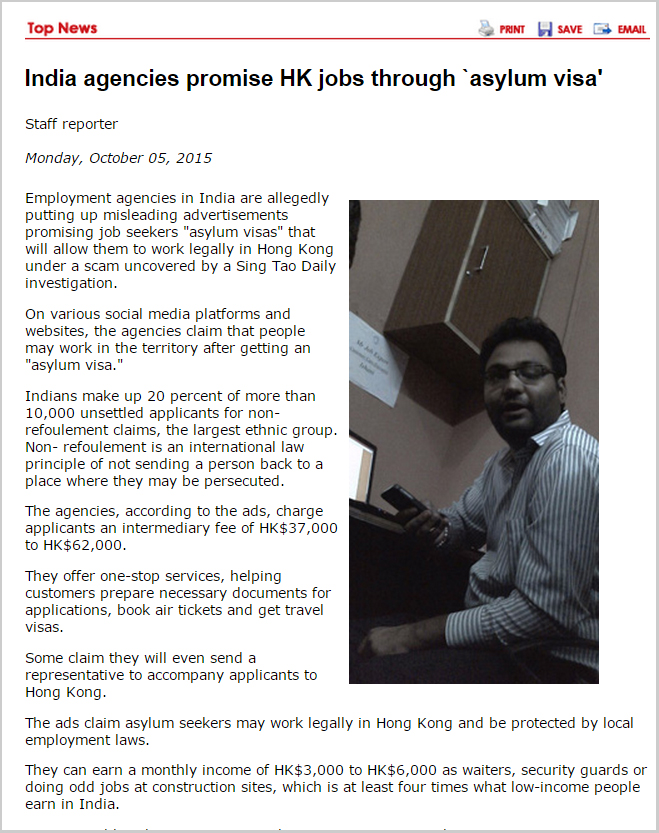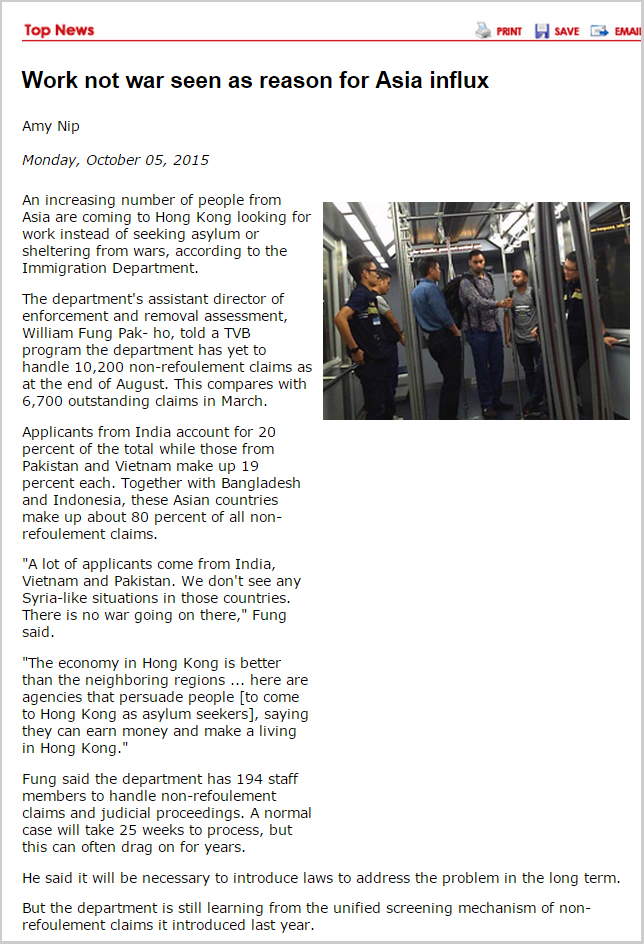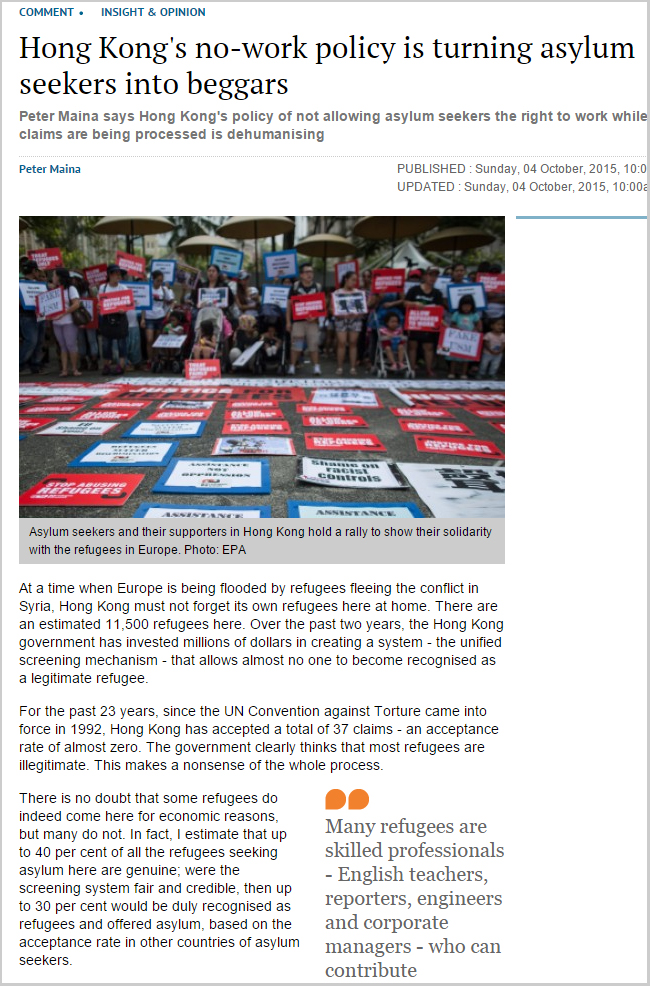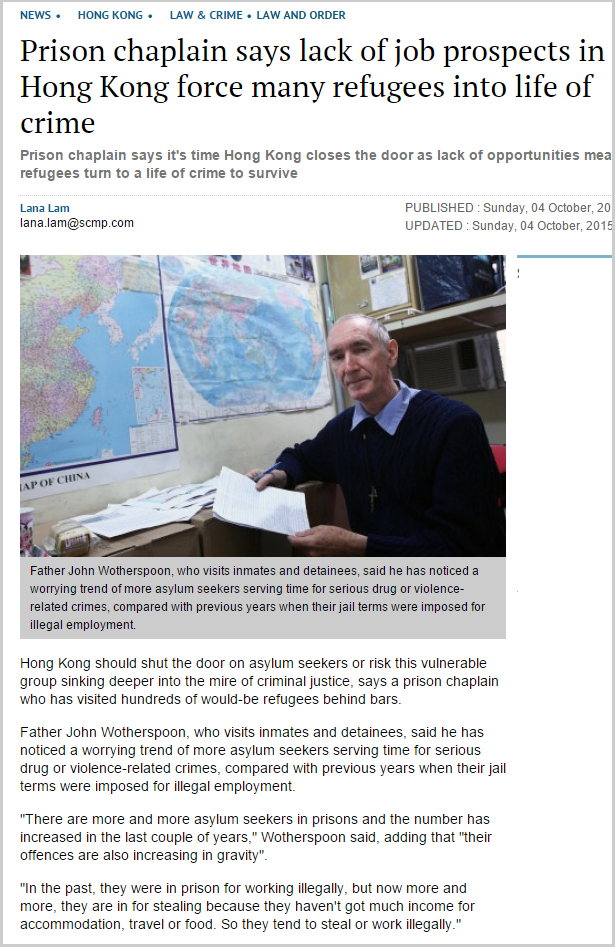Brainwashing through wrong questions
Oct 27th, 2015 | Advocacy, Crime, Immigration, Personal Experiences, Refugee Community, Rejection | Comment
Hello, this is Outsider. I’m writing again because I find that the article published by The Standard on 5 October 2015 is misleading, as it mixes up the issues of seeking asylum and seeking employment. The reporter writes about dodgy agencies in India that promise work though asylum visas. The featured website claims, “Hong Kong Asylum Visa.”
As a refugee I am deeply disappointed with the government propaganda broadcasted by the media reporting illegal activities by refugees who are then called indistinctly: illegal immigrants, criminals, job seekers and abusers of the asylum system. The Immigration Department is always ready to make press releases when it arrests claimants working (link).
Some people consider the above to be true. Some people get angry and try to advocate and defend refugees. In interviews, journalists should ask more revealing questions. For example, they should ask: Why are some refugees forced to work? Why do some refugees commit crimes? Why do some refugees get involved with drugs? I hear many advocates answer with reasons about the lack of government assistance, including the biggest problem: high rents in Hong Kong.
It seems to me that many fail to grasp the bigger picture. Is it possible that the wrong questions are asked and the wrong answers given? There is no doubt that government propaganda is winning the day, by shifting the focus on a small minority of refugee caught breaking the law.
But are we the real problem? Would the problem be solved and the debate end, if no refugee ever committed a crime (NB: working illegally is criminalized)? Are refugees the root of the problem, or is the system a problem? Is stopping refugees from working and committing crimes the answer to wasting hundreds of millions of dollars in the failed welfare/legal system?
To repeat, working illegally, committing crimes, joining gangs and pushing drugs are the external, visible symptoms of the illness which is the failed USM and welfare system. The real question is why journalists are not researching and reporting on the failed USM and the welfare/legal ramifications?
Is it possible to heal the illness by just treating the symptoms? Can the truth be uncovered by asking the wrong questions? What are the underlying problems that government propaganda is avoiding?
People who wish to understand the big picture might ask: Why did two thousand Vietnamese who were working illegally, recently applied for asylum? Why are criminals and drug dealers masquerading as refugees? Why are dodgy employment agency offering “Asylum Visas”?
There is a subtle difference between asking these two questions: 1) Why are refugees working and 2) Why are illegal workers claiming asylum? For uncritical readers it is a question of semantics. For the government it demonizes refugees. For some citizens it is proof of abuse. For a refugee fleeing persecution, the difference is life and death and an unbearable life in Hong Kong.
It appears that the government is astutely orchestrating propaganda to cast refugees in a bad light and turn public opinion against the refugee community. I am worried that the constant negative reporting and Immigration press releases are brainwashing the public and generating a ‘push back’ sentiment that will unfairly harm refugees stuck in this hostile city. The article below should be titled “Twenty-two immigration offenders arrested – as 37 refugees offered protection out of 17,000 claimants since 1992”.
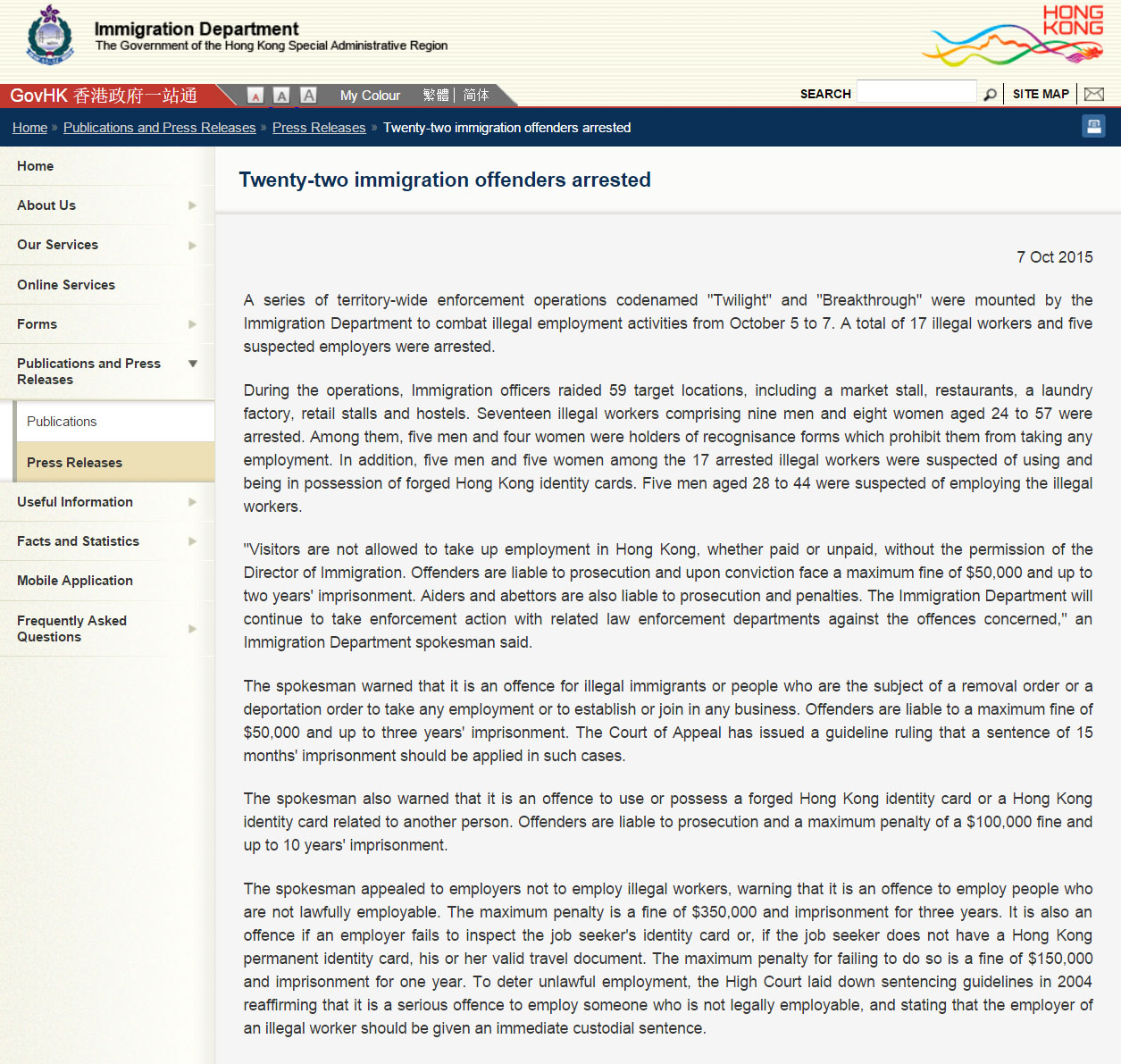
HK presents a hostile environment to those seeking protection
Oct 15th, 2015 | Crime, Immigration, Media, Rejection | Comment
The time when Hong Kong received thousands of Vietnamese asylum seekers may still be a vivid memory for some, though it is probably fading for most others. As indicated in the article below, it is true that a concerted response by the government helped to avert a greater crisis.
Yet it is often forgotten that the response was humanitarian at first, though later transformed to mark the extraneousness of unwelcome arrivals from law-abiding Hong Kong society. The camps became places of vice and lawlessness under Hong Kong’s watch. Their depiction as such was never delete from public discourse affecting policy to this day.
The present reality suggested in the article below of government-engineered hostility towards asylum seekers finds its roots in the Vietnamese era. We no longer have camps, but refugee slums have assuming the same function. The self-serving demonization of asylum seekers who take up Hong Kong’s offer of asylum continues.
As it was the case back then, asylum seekers are legally marginalized, confined in spaces of immiseration that challenge their survival. They are portrayed as abusive, criminally-minded economic migrants with little though to the reason why such survival strategies are adopted today as they were back then.
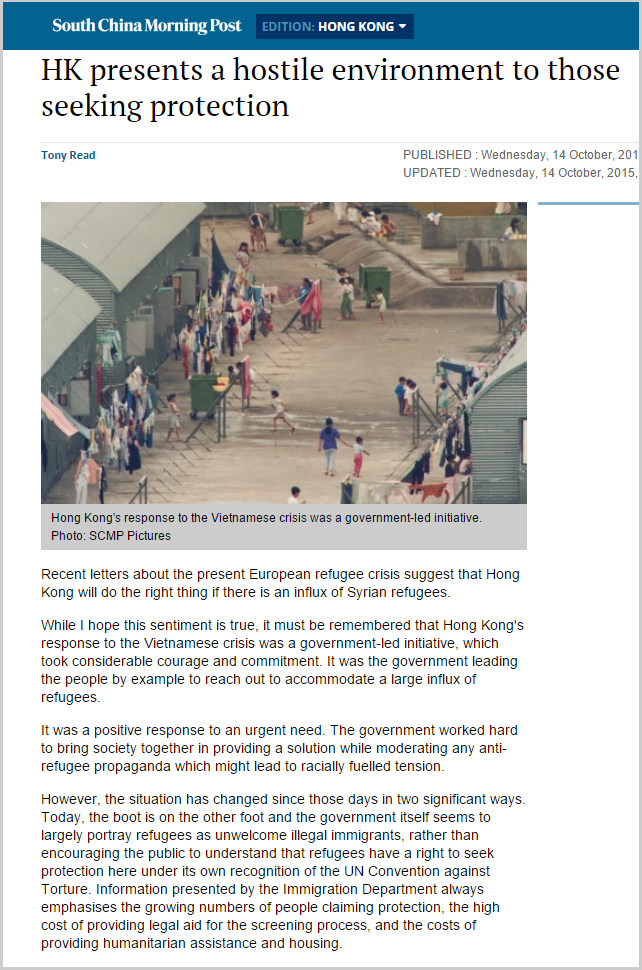
Thinking like a villager in Asia’s World City?
Oct 9th, 2015 | Advocacy, Crime, Media, Racism, VF Opinion | Comment
It is reproachable that at times persons whose opinions might be esteemed, and should thus carefully word and base statements on facts, cast judgments that verge on xenophobic intolerance, contrary to the best interest of Hong Kong. As a commentator in a local newspaper recently observed, “We often say we want to be a world Asian city, but we behave like a village”.
One example is Mr. Fung Keung’s op-ed published on 8 October in the China Daily, which contains several mistakes to say the least.
First, a rise of arrested asylum seekers from 683 to 904 in a three-year span is hardly indicative of a crime surge when contemporaneously asylum applications increased several folds to over 10,000. Comparatively, it could be argued that the crime rate among asylum seekers has decreased over the period, and indeed is quite low given that many work to support themselves. It is notorious that welfare assistance for asylum seekers is insufficient to make ends meet.
Second, that asylum seekers are arrested for crimes other than working illegally to a larger extent than before may not necessary show that asylum seekers are turning to violence. Rather it may be dependent on which crimes and who is policed in society, and related priorities of law enforcement.
Third, Fung hints that the victims “are believed to be Hong Kong citizens” and asylum seekers should not be accepted in Hong Kong because the city owes them nothing. Rather asylum seekers, when compared to Singapore, make Hong Kong dirty and unsafe, hurting citizens who would otherwise live in a peaceful environment.
Overlooking for a moment international and domestic legal obligations towards refugees, Vision First queries, does Fung really think that local citizens do not commit crimes? Who does Fung think are the employers and recruiters of asylum seekers? Who does Fung believe are the people whose behavior is learnt and with whom connections are made in local prisons by asylum seekers? Perhaps an overview of police charts would have helped Fung formulate more accurate opinions.
Fourth, it is arguable that asylum seekers borrow money from their smugglers, leaving them no choice but to commit crimes to repay such debts. This would certainly be a situation akin to trafficking, in which case Fung should be concerned of Hong Kong responsibilities in setting up a policy framework that tolerates such circumstances. In reality, research supports conclusions quite opposite to Fung’s intolerant views. Vision First would certainly appreciate if Fung agreed to disclose the research he conducted to ground such opinions. A rapid search online did not produce satisfactory results.
Fifth, Fung argues that it is “common sense” that “tells us that religious and political persecution in these countries is extremely rare”. Vision First cannot but query if the same “common sense” is used by immigration officers and adjudicator when screening asylum seekers. The increasing number of rejections being quashed by court judges, often for failure to fully appraise country of origin information, would certainly call for a revision of such unhelpful “common sense”.
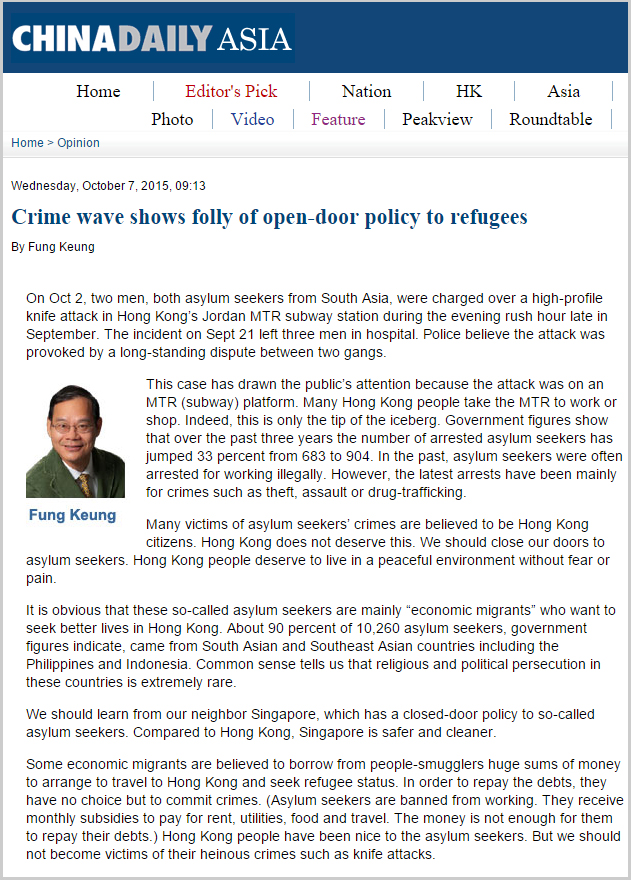
Shoplifting is a crime and I know it
Oct 9th, 2015 | Crime, Food, Personal Experiences, Welfare | Comment
Frankly it was the most humiliating experience in my life. The alarm rang when I left a Wellcome store after buying some groceries. Two members of staff stopped me and asked to look inside my backpack. They busted me for not paying for black pepper, yogurt and an air-freshener – total valued $196.
They called the police and I was taken to the back office for a preliminary investigation, before being escorted to the police station where an interpreter was called to make a statement. I was detained overnight and released on bail the following evening with instruction to attend Kwun Tong Magistracy later this month.
My offense happened in the afternoon of 3 October 2015, exactly a month after I collected from ISS-HK $1200 in Wellcome coupons for September and two days before my October appointment. That morning I neither had breakfast, nor lunch. Actually the week before the incident I only ate dinner, as food and coupons were running low.
My fridge was empty. I might as well have removed the power plug, as inside there was only bottles of tap water. My roommate and I had some oil and salt in the kitchen – nothing else. Even our knife was broken and the frying pan had seen better days. In September I paid 6 food coupons (each one worth $100) to my landlord to settle the outstanding electricity bill he pressured us to pay.
Waking up hungry on the morning of 3 October, I opened the empty fridge and asked my roommate, “Do you have any coupons left? I only have one.” He replied he had none and had recently borrowed two from a refugee. At that moment a friend called and asked to meet me in Jordan. I told him I could not, I was hungry, had nothing to eat and needed food for the weekend for myself and my roommate.
I visited a refugee nearby who lent me two coupons I promised to replace on Monday, after I collected mine for October. Then I walked to a nearby Wellcome store, where I put in the shopping basket the cheapest options for: onions, potatoes, tomatoes, fruit juice, eggs, condensed milk, teabags, sugar, bread and some other vegetables. The total bill was about $300.
When I placed some items in my backpack, I knew it was wrong. I was compelled to steal. I have never done it before in my life. It was foolish and I deeply regret it. In another lifetime … if my country were not ravaged by war … I would never steal to eat. I am a man of God who loves peace and believes in honesty. I know that stealing is wrong.
It is very hard to survive on $40 a day for breakfast, lunch and dinner. Everything is too expensive in Hong Kong. The small tub of yogurt was $85 and a necessity in our cuisine. We also needed the $32 of black pepper to cook. The air-freshener was $79. I intended to neutralize the stench in our small and damp room. I will never forget those prices I could not afford as I am not allowed to work.
As a refugee I feel that life is often beyond my control. I have to make tough choices to ration $40 for food each day. But I also used the food coupons to settle the electricity in our room. Further, my ISS-HK caseworker refused to refund $245 for cooking gas because the invoice showed my name. She requested that the gas company reissue it. However, seven times before I submitted similar receipts with my name and they were accepted. She said she would only refund $100 and I had to wait a month. That was my food money I used to pay for the gas. I felt I was cheated.
The truth is that I have never been this depressed and humiliated. My life is as damaged as my fridge is empty. My living conditions are grim and the situation is deteriorating since I sought asylum.
I am hanging by a thread that I fear will snap any moment and cast me into chaos. Hong Kong has put a timer on my life … blurring my existence … waiting for me to die slowly, slowly. I fend off thoughts of taking my life.
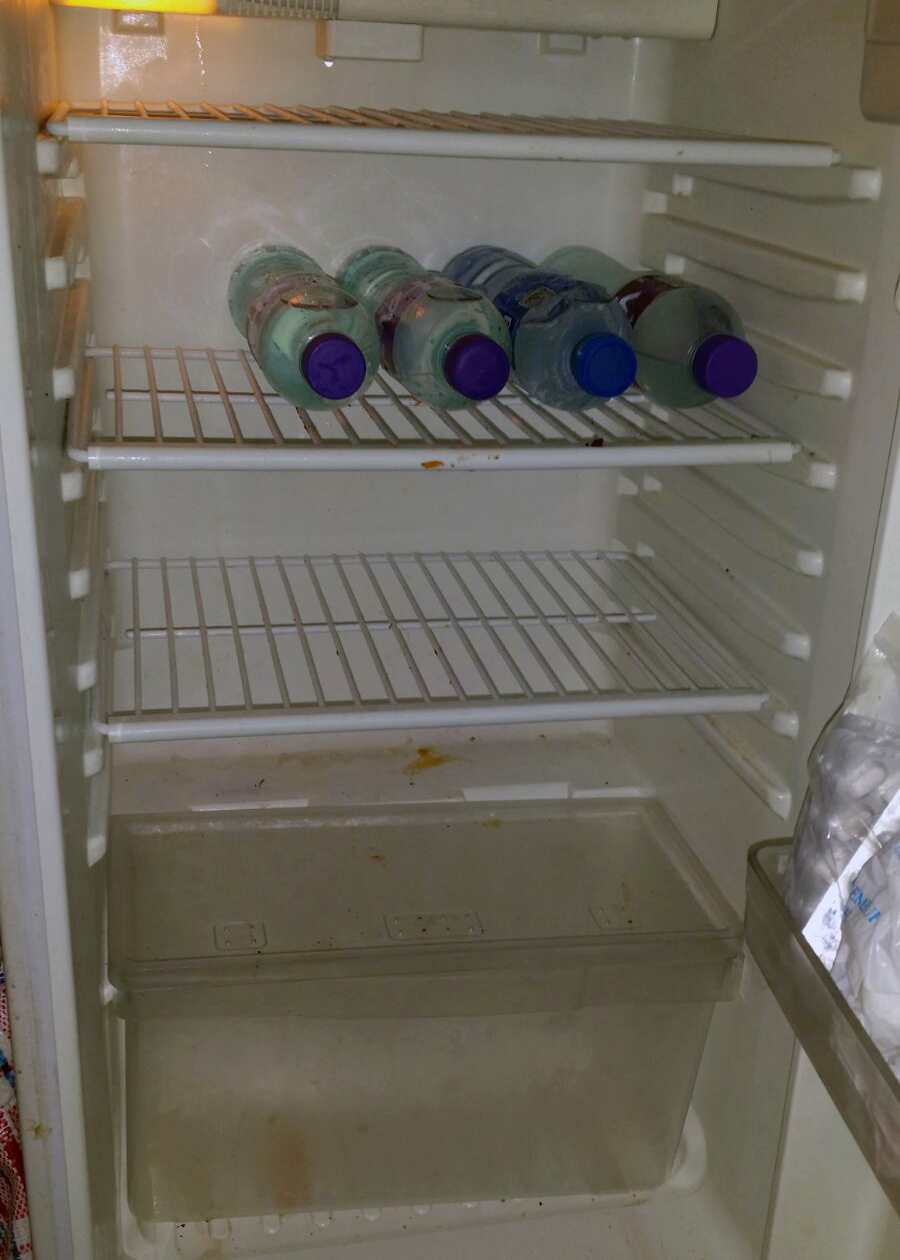
Security Bureau fails to comment on ‘cozy relationship’
Oct 7th, 2015 | Crime, Government, VF Opinion, Welfare | Comment
In reply to Vision First open letter to the Security Bureau, dated 4 July 2015
Vision First Questions:
1. Some lawyers confirm that most of their clients do not receive sufficient funds, or financial assistance in kind, or food coupons to meet their basic needs, as rents have increased and inflation has outstripped the amounts provided by SWD. This leaves refugees with no choice but to beg and frequently resort to working illegally. Is it not a fact that the increase in rents has outstripped the rental assistance provided to claimants?
2. Do you agree that thousands of asylum seekers lived for years, and hundreds continue to live, in abandoned chicken and pig farms sanctioned by the government as these were/are the only locations affordable based on government rent assistance?
3. Do you agree that such pig and chicken farms were/are not zoned for residential living? Is the government investigating why this happened and who is responsible for distributing public money to pay for illegal structures?
4. Will anyone be prosecuted for allowing dozens of refugee slums to develop and operate on funds paid from the public purse between 2006 and 2015?
Security Bureau (vague) reply:
Service users should be living in appropriate living environment. (NB: Supposedly not slums)
ISS-HK may require landlords to file supportive documents to indicate the premises’ condition.
For those assessed to be below standard, or where any illegal structures have been identified, ISS-HK would inform the service users concerned and advise them to move to another accommodation as soon as possible for the sake of their safety.
For those premises which warning letters have been issued by the Lands Department as illegal structures, ISS-HK will stop the rental payment to the landlords in the coming month.
Comment:
It is regrettably noted that the Security Bureau failed to comment on the ‘cozy relationship’ enjoyed by slum landlords who for years profitably settled refugees in makeshift huts and converted animal sheds erected on agricultural land manifestly not zoned for residential use, while ignoring the risks and dangers inherent in such questionable arrangements. Will anybody take the blame?
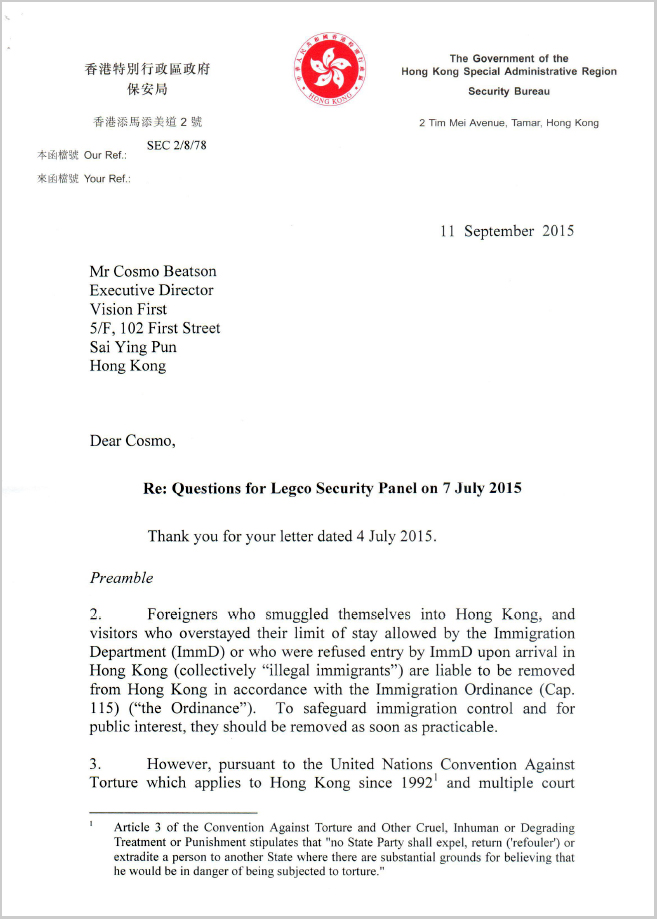
Misinformation spread in India
Oct 6th, 2015 | Crime, Immigration, Media | Comment
HONG KONG ASYLUM VISA
No Any Advance Charge
Urgent requirement for Hong Kong
General Worker, Waiter and Helper
2 Year Asylum Visa
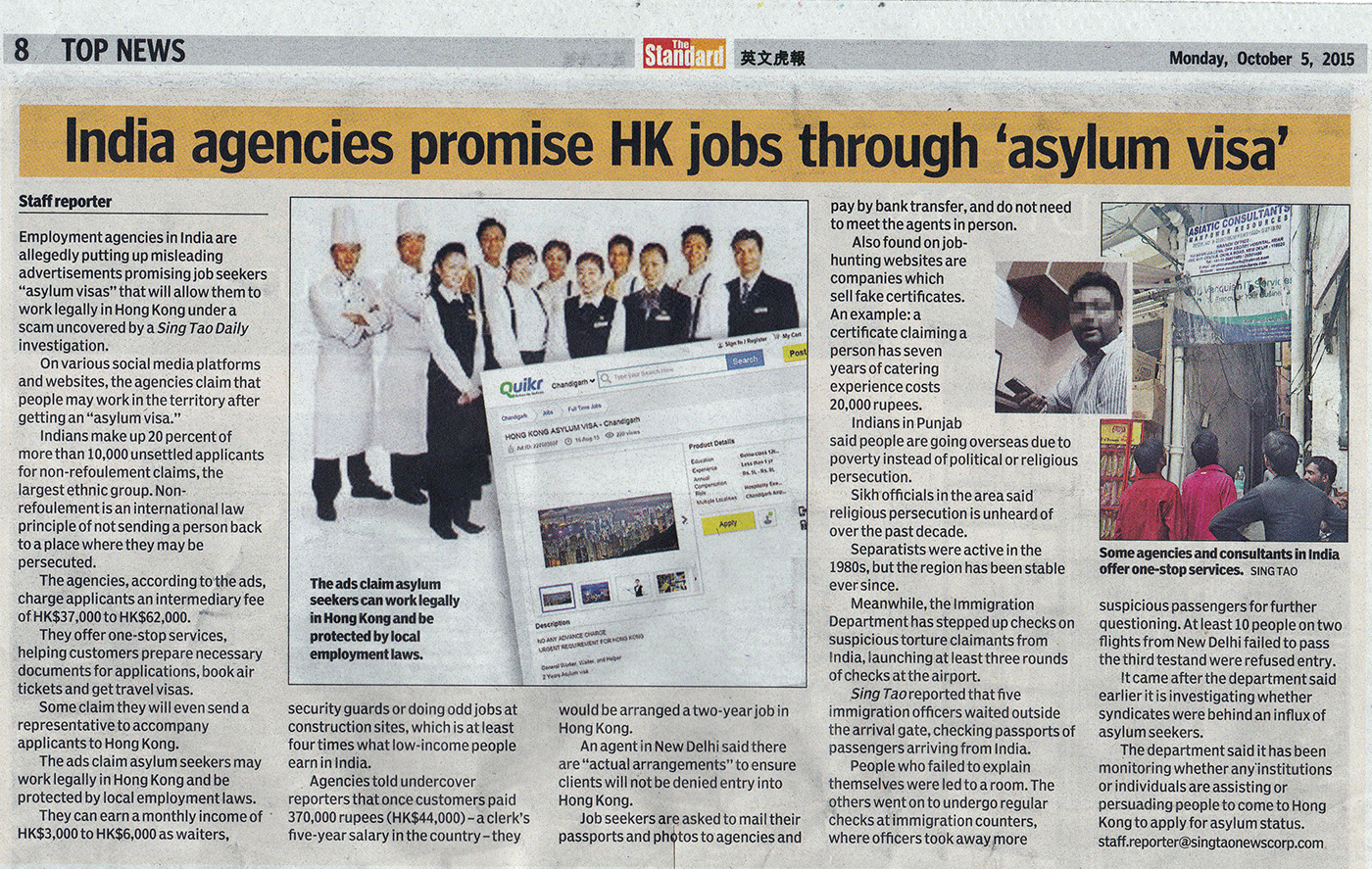
India agencies promise HK jobs through ‘asylum visa’
Oct 5th, 2015 | Crime, Immigration, Media | Comment
Work not war seen as reason for Asia influx
Oct 5th, 2015 | Crime, Immigration, Media, Rejection | Comment
Hong Kong’s no-work policy is turning asylum seekers into beggars
Oct 5th, 2015 | Crime, Immigration, Refugee Community, Rejection, Welfare | Comment
Prison chaplain says lack of job prospects in Hong Kong force many refugees into life of crime
Oct 5th, 2015 | Advocacy, Crime, Immigration, Welfare | Comment


